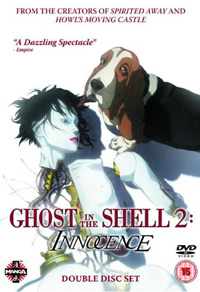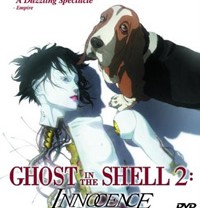 The original Ghost in the Shell (GitS) was a landmark in quality animation and it remains one of the most satisfying post-cyberpunk sf action movies ever made. Mingling philosophy with wild action sequences, GitS was an almost perfect blend of urban grittiness, large weapons, technology fetishism, big ideas and stylish violence. Now writer/director Oshii (Avalon) has returned to the world of Batou and the crew at Section 9 with a sequel: Ghost in the Shell 2: Innocence.
The original Ghost in the Shell (GitS) was a landmark in quality animation and it remains one of the most satisfying post-cyberpunk sf action movies ever made. Mingling philosophy with wild action sequences, GitS was an almost perfect blend of urban grittiness, large weapons, technology fetishism, big ideas and stylish violence. Now writer/director Oshii (Avalon) has returned to the world of Batou and the crew at Section 9 with a sequel: Ghost in the Shell 2: Innocence.
In the wake of Blade Runner and Neuromancer, many science fiction authors have struggled, and failed, to achieve the same, apparently effortless, unification of the weird and the wild. Ghost in the Shell deserves its place amongst the most exalted company and is marred only by a slightly abrupt ending. Now writer/director Oshii (Avalon) has returned to the world of Batou and the crew at Section 9 with a sequel: Ghost in the Shell 2: Innocence.
There is nothing abrupt about this sequel. Innocence is a thoughtful film, full of quotations from (amongst others) Buddha, Confucius, The Bible and John Milton, but it intersperses quite lengthy debates about what it is to be flesh and blood with high-octane battles and spectacular violence. Innocence is a remarkably made film. Watching both the original and its sequel together, it seems extraordinary that GitS is less than ten years old. In Innocence the world of 2032 is so much more fully realised, more precisely detailed and beautifully rendered that the original now seems rather dowdy – though it still has its own power. Production IG, the animation house behind both Ghost in the Shell and Innocence (and the anime interlude in Kill Bill: Volume One) has excelled itself – this is a beautiful film to watch.
If there is a weakness it is perhaps that Oshii has overindulged himself in his philosophical ramblings. The former seminary student seems more at home considering why humans are so obsessed with recreating and understanding the world through images of themselves – from dolls to clones, pets to children – that the forward movement of the plot is sometimes held back the philosophical debate. Once or twice the film chooses to batter the viewer over the head with displays of erudition rather than enlighten us through drama. Reports from studio insiders that the film’s Japanese producers wanted subtitles on the Japanese release because Oshii had his actors speaking an archaic form of Japanese demonstrates the risks taken with Innocence.
But this is no Matrix: Reloaded. The Wachowski brothers may have been inspired by GitS but despite a wayward middle third, Innocence is infinitely more artistically and intellectually coherent than its Western imitators. Most importantly, unlike the disappointing second and third Matrix films, Innocence rallies magnificently to deliver a thrilling and almost completely satisfying climax.
That said, Innocence doesn’t quite have the razor sharp focus of GitS – the “villains” of the piece are not revealed until near the end and there isn’t quite the same sense of dramatic tension that wowed us in the original.
Innocence is very good, but fans of the original shouldn’t expect a retread of GitS. This is a more complex and more thoughtful film, despite the ear-shattering gunfights. It is some time since an American (indeed a Western) science fiction film felt as satisfying on this many levels. Innocence is both intelligent and exciting. This is quality science fiction by whichever measure you choose to judge it, as thoughtful and entertaining as anything in literary cyberpunk.
At the time of writing it seems uncertain when (or if) Ghost in the Shell 2: Innocence will be released in UK cinemas and it will probably be available to import on DVD before it reaches cinemas here. That’s a great shame because Innocence is a visual treat and really deserves to be seen on a very big screen to be fully appreciated. However, Innocence is to be released in France and Belgium on 1 December, and might just be worth the trip across The Channel on its own.
